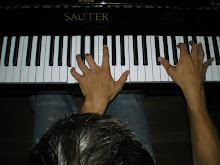Again, no one ever told me about this masterpiece, I had to discover it on my own. This symphony, in my opinion, is Sibelius' greatest achievement. I know the 5th, the 2nd, the 4th, the 7th, Tapiola, other works, but this has always remained my favorite work. Its odd to me that the 6th is rarely commented on or given the attention that is showered upon Tapiola and the 5th (or even the 7th!) 

The work is sunny, it is cheerful- but with a subtle melancholy so distinct to Sibelius' late work. The harmonies are rich, vigorous. Here he isn’t afraid of dissonance and breaking the rules. Here we have a unique, a truly original and independent musical voice, fresh and universal in its language.
Common in any discussion of Sibelius is the term "organic" unity- applied in particular to the symphonies. There is no doubt in my mind that this common phrase touches the truth. Its hard to describe his sprawling (yet distinct and organized) structures- it moves from one idea to the next (when at his best) flawlessly and logically, just as Beethoven might. There are shifts, sudden, yet fitting, and the movements have a cyclical feel- a massive epic that turns and shifts about... eventually returning to the main idea, the main concept of the movement. The best example is in the sublime first movement in his 3rd symphony which is nothing short of miraculous, but you'll find it in all of his best symphonies. Timothy L. Jackson and Veijo Murtomäki in their Sibelius Studies described the music as being in "rotational form".
...Apt.
I have seen writers describe the later works of Sibelius as "austere" -yet this work is a wonderful counter-example to that claim. The harmonies, rich and full of variety, the incredible lyricism- emotion pours out of the melodic lines. This not emotionalism in the typical romantic or modern modes, but a powerfully sincere - a deeply felt kind of emotion that really hits on the profound.
Sublime, the last two movements in particular, sublime. Sibelius, not Brahms, is the only worthy successor to Beethoven in the symphonic form.
Sibelius held up these same values that Beethoven clearly held- emotional sincerity, individualism, universality.
Thats the heap of praise I give Sibelius. If you have criticisms of this work (or my post) I wont cry. As always please speak your mind.

7 comments:
I rank 6 up there with 5 as my favs of his. I love how the last movement, with restrained emotion, grows dimmer and dimmer to an ear shattering silence.
Amen. One of my favorite works.
Couldn't agree more. I especially like the 6th symphony's third movement. It's got a mildly happy sound to it, reminding me of autumn leaves, snowflakes or fairies.
I agree this is his most sublime symphonic achievement. Totally unlike any other symphony. Passionate yet restrained emotional but detached. The finale is quite superb the marvellous coda especially. He could have ended in a major key - as the other masterpiece of the same time Tapiola does - but the final notes are music of an extraordinary and unparallelled clarity. An astonishing piece of music. The Vanska/Lahti performance is best. The much praised Karajan version is in my view awful - far too smooth.
I am sure for those who appreciate the 6th so much will all be perplexed by the neglected status of the work - one of the most original and beautiful creation in the symphonic repertoire.
But I must say in terms of being the successor of the Beethoven symphonic tradition, Brahms is nothing inferior to Sibelius (they are such different artists).
Mahler is my favourite, though.
I received the score in the mail only last week. Anyone who enjoys this Symphony, as is clear that many of you do should do the same. The listening experience is exemplified ever further when you see how he put it on the page. His best symphony by panels of fencing.
I love all the symphonies, the 6th is a very special work indeed. is strange that you mentioned almost all the symphonies but not the third. I think the third, more than the 6th, is the more neglected symphony of Sibelius, and is a radiant, beautifull work, which has the power to growth more and more in us at each hearing. Please forgive my poor englis, am a portuguese composer...
Post a Comment